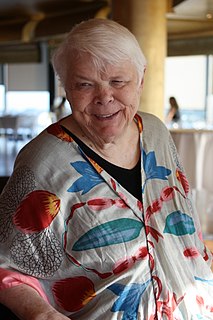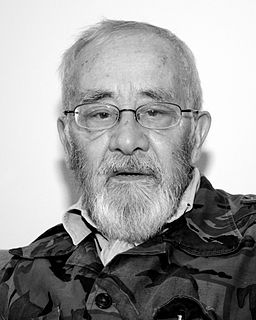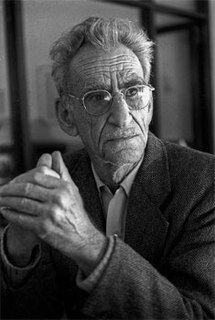A Quote by Jack London
When, on the still cold nights, he pointed his nose at a star and howled long and wolf-like, it was his ancestors, dead and dust, pointing nose at star and howling down through the centuries and through him. And his cadences were their cadences, the cadences which voiced their woe and what to them was the meaning of the stillness, and the cold, and dark.
Related Quotes
Walking the streets on winter nights kept him warm, despite the cold nocturnal passions of uprising winds. His footsteps led between trade-marked houses, two up and two down, with digital chimneys like pigs' tits on the rooftops sending up heat and smoke into the cold trough of a windy sky. Stars hid like snipers, taking aim now and again when clouds gave them a loophole. Winter was an easy time for him to hide his secrets, for each dark street patted his shoulder and became a friend, and the gaseous eye of each lamp glowed unwinking as he passed.
Lastly came Winter cloathed all in frize, Chattering his teeth for cold that did him chill; Whilst on his hoary beard his breath did freese, And the dull drops, that from his purpled bill As from a limebeck did adown distill: In his right hand a tipped staffe he held, With which his feeble steps he stayed still; For he was faint with cold, and weak with eld; That scarce his loosed limbes he hable was to weld.
Cold?" Ravus echoed. He took her arm and rubbed it between his hands, watching them as though they were betraying him. "Better?" He asked warily. His skin felt hot, even through the cloth of her shirt, his touch was both soothing and electric. She leaned into him without thinking. His thighs parted, rough black cloth scratching against her jeans as she moved between his long legs. His eyes half-lidded as he pushed himself off the desk, their bodies sliding together, his hands still holding hers. Then, suddenly, he froze.
The child had indeed shut up but all the questions that had accumulated on his tongue circulated in his mouth, moved through the passages of his nose and climbed up from there to tickle into his teardrop ducts, so in his moss green pupils, curious, insistent, accusing sparks of questions continued to light up and fade away like fireflies flitting about on summer nights.
It's Toby Jones playing Alfred Hitchcock, not Alfred Hitchcock. We all felt that his silhouette was crucial, so his nose and lips were crucial as well. We had to build it out a bit to get the silhouette. But, with my nose being so small within the proportion of my face, the first nose was too big. I felt like a nose on parade.
His mouth opens. From inside him comes a slow stream, without breath, without interruption. It flows up through his body and out upon me; it passes through the cabin, through the wreck; washing the cliffs and shores of the island, it runs northward and southward to the ends of the earth. Soft and cold, dark and unending, it beats against my eyelids, against the skin of my face.
Of all ridiculous things the most ridiculous seems to me, to be busy — to be a man who is brisk about his food and his work. Therefore, whenever I see a fly settling, in the decisive moment, on the nose of such a person of affairs; or if he is spattered with mud from a carriage which drives past him in still greater haste; or the drawbridge opens up before him; or a tile falls down and knocks him dead, then I laugh heartily.







































